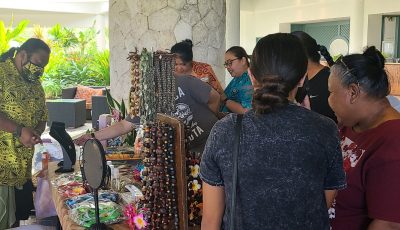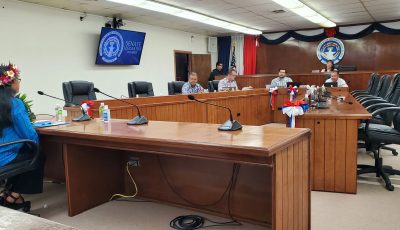AFTER MEETING WITH THURSDAY MARKET VENDORS
DCCA puts off vendor’s fee increase

Department of Community and Cultural Affairs Secretary Robert Hunter talks about the proposed vendor’s fee hike to Thursday Market vendors during a meeting last Friday at the Carolinian Utt. At left is J.M. Guerrero, former Marianas Visitors Bureau managing director and owner of one of Hula Girl, which sells local delicacies like apigigi at the Thursday Market.(Erwin Encinares)
Department of Community and Cultural Arts Secretary Robert Hunter announced his department will, as of the moment, no longer be raising vendor’s fees at the Thursday Market during a meeting with vendors last Friday at the Carolinian Utt.
After hearing the concerns of vendors of the weekly food and arts fair and getting criticism from the plan days before the dialogue, Hunter said DCCA will first try to lower expenditures. He also said another option is to ask the Legislature to give the Thursday Market an annual budget for the next fiscal year.
Hunter also volunteered in the meeting another reason the DCCA is not going to increase selected vendor’s fees is because a private company is willing to subsidize the street market, but talks are still on the way.
“I’ve also met with stakeholders; I won’t tell you who because I don’t want to put them on the spot now but they’re meeting with their own boards and members to help subsidize the market so that we can bring that expenses to revenue difference a little bit closer,” said Hunter.
“Just by that alone we would be able to stretch out the market probably pretty much the year without raising fees, that doesn’t mean we’re going to close this deficit so we really need these subsidies from these particular agencies which we would probably get.”
J.M. Guerrero, former Marianas Visitors Bureau managing director who owns Hula Girl, was pleased with Hunter’s announcement. Guerrero also wishes that if ever there were to be a raise in the vendor’s fee, it would be gradually rising instead of a sudden increase. Hula Girl sells apigigi, empanada, and other native delicacies at the Thursday Market.
Rose Chan, owner of Canton Restaurant, let out a sigh of relief now that the vendor’s fee won’t increase. Chan would once again be considering the financials if an increase in the vendor’s fee would come, even a gradual increase would force her to reconsider selling at the street market.
Like Hula Girl, Canton Restaurant is a staple at the weekly street market where it sells bento meals for $5 for five choices.
Hunter reiterated that the Thusrday Market is not self-sustainable anymore. As of last Thursday, Aug 25, the overall funding that the weekly food and arts fair has with the Department of Finance is $15,000 and after the next street market, Hunter suspects it to sink to $14,000.
“This [Thursday Market] has to be as close to self-sustaining as can be. There isn’t a street market allocation, there isn’t a street market fund; nobody to this point has subsidized the market. It’s been living off this fund that has almost completely depleted,” said Hunter.
The Commonwealth Council for Arts and Culture is now working with providers of various logistical necessities such as tents, tables, electricity, and more in an effort to lower expenditures. “We set to work on lowering the logistical costs which the Arts Council is still doing right now, trying to renegotiate with the tent vendors, searching for new vendors if possible,” shared Hunter. “We have identified another company that will save us $250 a month on the street market but will provide a permanent stage as well and better sound equipment. So we’re first going through the expenses and looking to lower costs wherever we can.”
Hunter said that the DCCA would like to cut costs as much as possible. Unnecessary expenditures that are not crucial to the overall operations of the street market would be omitted. “What we’re trying to do is address every other avenue which also includes cutting out totally unnecessary stuff, stuff that might’ve enhanced the market [such as] shirt printing and apron printing. There is a whole list of stuff that isn’t really integral to the weekly operations of the market, unlike tents, restrooms, sound and stage, entertainment; so we’re cutting all of that out,” said Hunter. “We’re going to try and bring the cost as low as possible and identify new revenue sources before we pass on any fee hikes at this point.”
Changes also include the introduction of a new policy, one that requires vendors to pay for reserved tents whether they show up or not. “We’re going to have to enforce when you reserve a tent but don’t show up, you’d still have to pay for it. Because we have these tents that go unpayed for, unfilled, and so that’s a loss for everybody. Everybody loses when that happens. But the street market fund loses the most,” said Hunter.
Hunter says that just in case the street market does not get the subsidies from the private company, talks would be made with the Legislature to include the Thursday Market in the budget for the Fiscal Year 2018-2019. “If we could string it on long enough we could go to the Legislature and ask for an appropriation or try to get it into the FY18 budget,” said Hunter.
Comments made in disagreement to Hunter’s decision of raising certain vendor’s fees have surfaced, but Hunter said, “I think the days of considering the market self-sustainable are gone. Comments have been made to me in the last couple of days that say the market should pay for itself. If that were the case, then we would really need to raise the fees. We’re not going to do that,” said Hunter.
In the event of an increase in vendor’s fee, it would usually go to vendors with the highest revenue in the market. “Fee hikes are passed on nominally to the highest earners at the market. We’re hoping that doesn’t have to happen. We’d really like to be in a place where, especially for our artists and our sellers of local produce, we’re lowering the fees as this was the entire purpose of the market.”
Hunter recognizes the importance of the Thursday Market and said he is working hard in order to preserve one of the few showcases of CNMI culture that is available to tourists any time of the year.
“This is about the arts primarily in culture. The market has taken on a life of its own; it is important to a whole lot of people, it’s important to stake-holders, the community loves it, it’s great for our tourists, so it’s something we don’t want to see not continue, but if we’re going to continue to operate it, it’s something that we’re going to need to tweak and we’re going to need to bring the finances in line,” concluded Hunter.



























